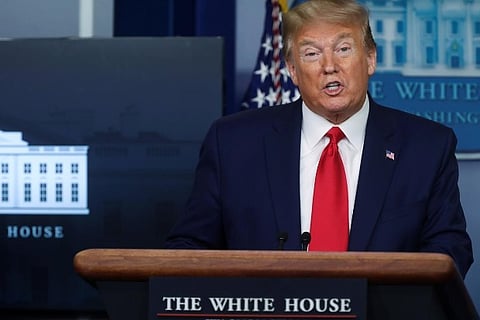

Washington
WASHINGTON (Reuters) - President Donald Trump’s response to the coronavirus outbreak took on a sharper political tone with his pledge to suspend immigration into the country, while Georgia and other U.S. states began lifting restrictions that stalled their economies.
Trump made the immigration announcement in a Twitter message late on Monday night, suggesting his action would prevent further contagion from outsiders while saving American jobs.
Trump, elected in 2016 in part on his vow to stamp out illegal immigration, had staked his re-election in November on the strength of the U.S. economy, which has been sapped by the economic shutdown aimed at stopping the pandemic. He has now been pressing for states to begin easing restrictions that have left a record 22 million people seeking unemployment benefits.
“In light of the attack from the Invisible Enemy,” he tweeted, referring to the pandemic, “as well as the need to protect the jobs of our GREAT American Citizens, I will be signing an Executive Order to temporarily suspend immigration into the United States.”
The White House declined to offer further details on the reasoning behind the decision, its timing or its legal basis.
Trump was due to meet later in the day in the Oval Office with Governor Andrew Cuomo of New York, the state hardest hit by the outbreak. The Democratic governor has voiced strong opposition to Trump’s record on immigration and has clashed with the Republican president over a lack of testing and medical equipment to fight the outbreak.
Cuomo has mostly sidestepped potential confrontations with Trump, emerging as a foil to the president by projecting a calm and fact-based approach to the crisis.
New York accounts for nearly half of the 42,400 coronavirus deaths in the United States, according to a Reuters tally, and even though the outbreak appears to be past its peak in New York, Cuomo has insisted on a go-slow approach to reopening.
GEORGIA TO REOPEN
By contrast, Georgia Governor Brian Kemp, a Republican, on Monday said that gyms, hair salons, bowling alleys, tattoo parlors and massage parlors could reopen on Friday, followed next Monday by movie theaters and restaurants.
Kemp described it as a measured approach to balance the health of the state’s economy with public health concerns, saying stay-home orders, social distancing and other steps to stanch the outbreak would remain in place.
Georgia has reported 174,000 positive cases and six deaths per 100,000 people, both below the national average, according to a Reuters analysis of data collected by the Covid Tracking Project. But the state has one of the lowest testing rates, ranking 42nd out of the 50 states and the District of Columbia, giving health officials less data on the reach of the illness to base decisions on reopening, the data showed.
Some local officials have questioned Kemp’s decision, saying it may jeopardize the health of residents.
“I really am at a loss as to what the governor is basing this decision on other than getting people back to work, which is extremely important,” Atlanta Mayor Keisha Lance Bottoms told CNN on Tuesday. “But for us to have a strong economy we have to have a strong, healthy community.” The governors of Colorado and South Carolina also announced steps to reopen some businesses, subject to certain social distancing measures remaining in force.
New York City is moving in the opposite direction by canceling all concerts and other large events through June.
The city’s mayor, Bill de Blasio, on Tuesday said Trump could “kiss his re-election goodbye” if he did not address the shortage of testing supplies and provide more federal assistance to cities and states with battered finances.
“These are the two things he has dropped the ball on,” de Blasio said on CNN, describing Trump’s comments on immigration as a diversion. “You are not going to have a restart and economic recovery if cities and states are back on their heels.” In Washington, the U.S. Congress moved toward a fourth coronavirus economic relief bill expected to top $450 billion. Senate Democratic Leader Chuck Schumer said the Trump administration has signed off on a national testing strategy.
Visit news.dtnext.in to explore our interactive epaper!
Download the DT Next app for more exciting features!
Click here for iOS
Click here for Android